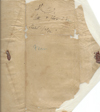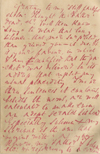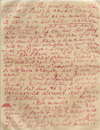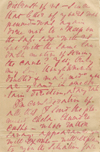Mahatma Letter to Fern - LMW 2 No. 75
| Quick Facts | |
|---|---|
| People involved | |
| Written by: | Morya |
| Received by: | Edmond W. Fern |
| Sent via: | unknown |
| Dates | |
| Written on: | 1882 |
| Received on: | 1882 |
| Other dates: | unknown |
| Places | |
| Sent from: | unknown |
| Received at: | Simla |
| Via: | unknown |
This letter is Letter No. 75 in Letters from the Masters of the Wisdom, Second Series. Mahatma Morya is trying to consider whether Edmond W. Fern can still be considered a chela after the young man admitted that he belonged to another society besides the Theosophical Society.[1]
< Prev letter in LMW 2
Next letter in LMW 2 >
Envelope
|
Edw. W. Fern, Esq. An outer envelope has these notations: M. Fern |
NOTES:
|
Page 1 transcription, image, and notes
|
Editor Jinarajadasa's footnote: "The words and phrases in inverted commas are evidently quotations from Mr. Fern’s letter to the Master."[2] Greeting to my “still faithful chela”. Thought the “Father” dead, eh? Well then know “Sonny” to what that long silence – that more surprised than grieved you – is due. It is your favour, in which I am notified that the “packet” was delivered to its address, that upset my usual placidity. Two or three sentences it contained, besides the news, are well calculated to make even an adept scratch his head. Especially solemn and mysterious is the one that begins with “As you know, my Father, I belong, etc.,” and referring to a certain |
NOTES: |
Page 2
|
secret society. This news that you belong (besides the Theos.) to another “Society of . . .” in which no one member knows the other, and one that neither practices nor tolerates deceit – filled me with awe and admiration, no less than that other piece of news that informed me that some of its members claimed to know and communicate with me. Alas! Notwithstanding your assurance – “as you (I) know” – I confess to my great shame, that I know very little of it – probably owing to your usual precaution. Hitherto, you had locked it up so safely in a remote corner of your brain, & “composed your mind” so well when writing to me, that of course I was unable to get at it. Yes; we know little of it; too grand and respectable for us, altogether, notwithstanding the acquaintance claimed. And since regardless of its Carbonari-like character, that precludes the possibility of one member knowing any other member, you still seem to know several of them who claim to know & hold relations with me – I must naturally infer that you are very high in it – its President perhaps, the “High Venerable Master”? |
NOTES:
|
Page 3
|
Well, this suspicion led me to think that one so high in a Society that neither tolerates nor practices deceit, could not care to belong to our poor Brotherhood that does both – regarding its probationists. Hence – my silence. But since in your following you so touchingly complained of “not having been blessed with a communication” from me, I am again constrained to infer that you have not yet thrown us altogether overboard, our deceitful ways notwithstanding; & that even everything done by you to show your |
NOTES: |
Page 4
|
distrust of us — since that letter of yours was penned — was again done not to “keep on the safe-side” with us but with the same laudable motive of serving the cause? Yes, truly, my son, though “so much doubted and maligned,” you are grand, in one certain direction, at any rate. In consideration of all this, I send the promised chela. Chundro Cusho, – whose rather savage appearance you will excuse – will explain to you the situation far better |
NOTES:
|
Page 5
|
better in words than any letter of mine can. You will have to accept his conditions or – my grief notwithstanding – we shall have to part company. Meanwhile, my beloved son and “faithful chela,” do not think of me any the worse if I close this letter with sending you a second warning.
|
NOTES: |
Context and background
Mr. Jinarajadasa provided this background information:
Mr. E. W. Fern was a young Englishman born in India, who was tried as a pupil by the Master M. He had certain latent possibilities, and had he succeeded, it was the Master’s plan to make him a centre of His magnetism. He was some sort of a secretary to Mr. A.O. Hume, and was elected Secretary of the Simla Eclectic T.S. in October, 1882. However, he failed as a pupil. There are two entries about him in Colonel Olcott’s Diary for 1882. On August 18, H.S.O. was in Ceylon, H.P.B. being in Bombay. “Night visit from M. who directed telegram to be sent A.H. about Fern’s visions. Can’t understand.” On November 27, in Bombay, the entry is: “A Brother showed himself in the lower terrace to a number of delegates. M. orders me to expel Fern. Reason not given. What’s up?” On December 6, Mr. Fern himself came to see Colonel Olcott, and explained certain matters which the Colonel saw necessitated the expulsion. The reason were not psychical at all, but were purely on the material plane, dealing with business transactions. I presume it was at this time that Mr. Fern returned the letter, with a photograph which the Master had given him, for they are at Adyar [3]
Physical description of letter
The original letter is preserved at the Theosophical Society, Adyar, Chennai, India.
Publication history
Commentary about this letter
This letter demonstrates Master Morya's use of irony in his writing.






